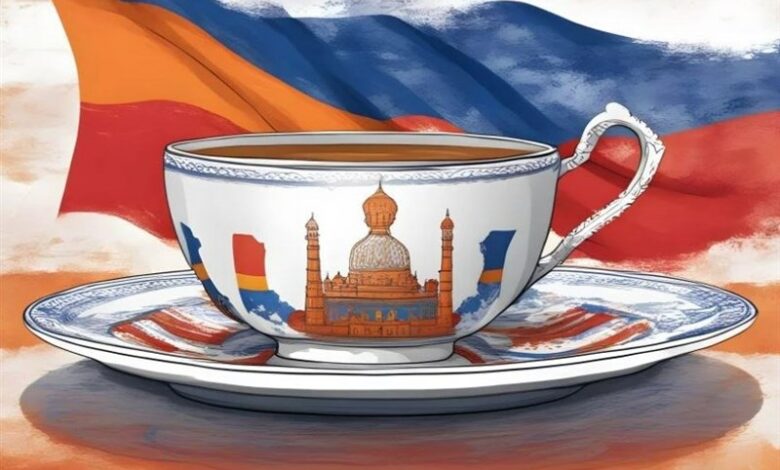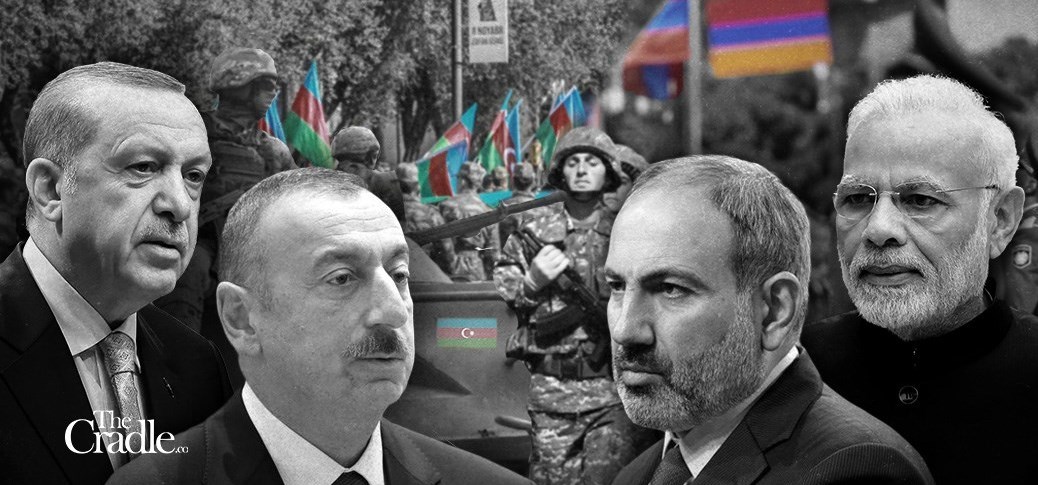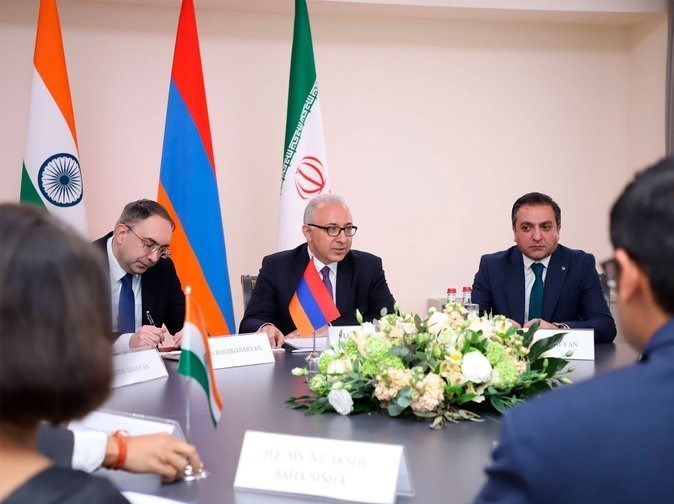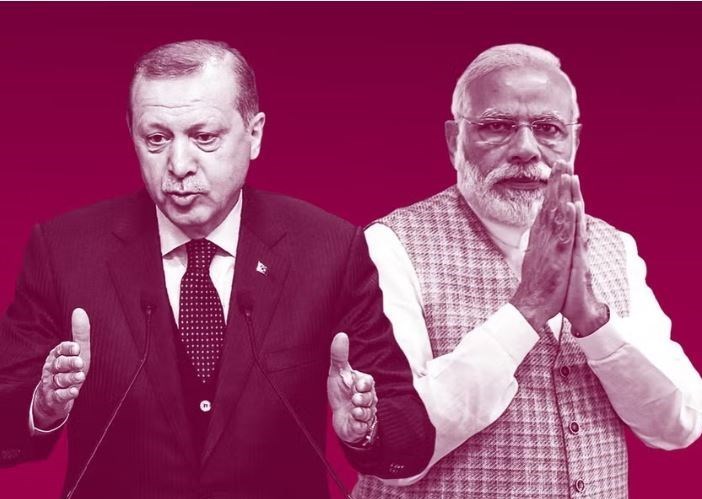India’s presence in South Caucasus and its consequences for Iran, Russia and Türkiye

| The modern transformation of the world order is associated with the growth and strengthening of new power centers and the expansion of their geographical presence. One of these centers is India, which has become a prominent actor in the South Caucasus in the past year. |
According to the international group Tasnim news agency, political and geopolitical dynamics in In recent years, the South Caucasus has changed the usual balance of power in the region. Against the background of Russia’s traditional role, both regional actors such as Iran and Turkey and extra-regional actors such as France, the European Union, and the United States have begun to play a more active role in the South Caucasus region. Competing to be present in the field and also to participate in the negotiation formats that determine the regional balance today.
One of the important components that can affect the regional dynamics is the emergence of new actors such as India. .
It is worth noting that before India had a significant presence in the South Caucasus, Pakistan had shown some activity in the past years. In 2017, a tripartite declaration on cooperation in the region was signed between Baku, Ankara and Islamabad.
Later in 2020, Pakistan supported Azerbaijan during the Nagorno-Karabakh war and subsequently Regular participated in exercises with Ankara and Baku, which were called “Three Brothers”.
In January 2021, the Islamabad Tripartite Declaration was signed between the parties, which emphasized solidarity with the government and people of Azerbaijan. It was emphasized after the war. It was also noted that the parties attach great importance to efforts to promote peace, stability and development in their regions (South Caucasus and South Asia) as well as “efforts to promote these ideals for common prosperity and security in the wider region”.
Then, in July of the same year, the Tripartite Baku Declaration was signed, designed to help strengthen strategic ties between the three countries. Military and technical cooperation was implemented between the parties. At the same time, the expansion of Pakistan’s geographical presence did not go away from the eyes of the Indians. He supports the Kashmir issue. Türkiye has adopted a similar position in this regard. This tripartite format of Ankara-Baku-Islamabad manifested itself in the Nagorno-Karabakh conflict in 2020, when Pakistan and Turkey actively supported Azerbaijan’s actions.
This tripartite cooperation, India determined to create a tripartite platform including India, Armenia and Iran. It is noteworthy that Armenia clearly supports India’s approach to Kashmir. This triangular cooperation is primarily focused on communication and resource management. However, in the future it can be seen as an opposition to the growing cooperation of the existing Ankara-Baku-Islamabad pact.
Today India is becoming a key partner. Armenia is in the field of military and technical cooperation. This position was previously held by Russia, which supplied more than 93 percent of Armenia’s weapons and military equipment between 2011-2020.
Later in 2021, Yerevan and Moscow again signed a new arms supply agreement. However, due to the impossibility of fulfilling the contract obligations due to the conflict in Ukraine, the Russian manufacturers could not deliver the equipment within the specified time. This created a gap that Yerevan had to fill quickly, as Baku continued to buy weapons, mainly from Israel and Turkey, and was putting military pressure on Armenia.
According to various estimates, the total volume of arms and military equipment contracts between Yerevan and New Delhi is about 2 billion dollars, which includes a wide range of products. These contracts include the purchase of the Pinaka rocket launcher system, Swati artillery locator radars, anti-tank missiles with ammunition, 155 mm cannons and anti-drone systems.
It should be noted that Armenia is the first foreign buyer. The operator of the air defense system is Akash India. According to Indian experts, Armenia is gradually becoming India’s strategic partner in the South Caucasus by becoming the largest importer of Indian arms. In addition to military deals, another important development in the defense sector was the mutual appointment of military attachés by the parties.
The aim of this project is to connect India to the markets of the European Union and the Eurasian Economic Union through Iran. Armenia, Georgia and the Black Sea, especially given the fact that India faces logistical challenges with the European Union both through Russia due to the conflict in Ukraine and through the Suez Canal due to congestion and rising tensions in the Red Sea.
According to the plan, the cargoes will be delivered to Iran’s Chabahar port, and then they can reach the markets of Russia and Europe through the territory of Armenia and Georgia.
With continued economic growth as well as rising tensions in the Middle East, it is important for New Delhi to have access to diverse trade routes that provide faster and safer transportation capabilities to connect with global markets.
Remaining areas of cooperation between Armenia and India are next in importance to maintain the growing level of relations. Cooperation agreements with economic nature, investment, energy, customs control, immigration, etc. are proof of this.
Importance for Russia
The gradual expansion of India’s presence in the South Caucasus may be understood by regional actors in different ways, although it all depends on the extent to which the actors’ interests intersect. . Considering the role and position of the Caucasus region in Russia’s modern foreign policy strategy, this presence can be examined from several aspects for Moscow. has started and is treated as a zero-sum game. In this context, India is not part of the collective/political West and is not looking for competition. Competing in a region that is in Russia’s sphere of interest is not on India’s agenda. Therefore, the expansion of New Delhi’s presence in the South Caucasus is not considered a zero-sum game for Moscow.
2- India considers Armenia as a bridge to reach the Eurasian Economic Union. Negotiations between the parties on the creation of a free trade zone continue, with New Delhi preparing to become an observer state of the Eurasian Economic Union this year. In this context, Armenia is considered as a natural continuation of an economic union that is able to connect this union and India. The organization of the Collective Security Treaty and the Eurasian Economic Union in the region leads to the strengthening of Yerevan’s military potential. This, in turn, will help equalize the balance of power in the South Caucasus and reduce the risk of a new escalation of tension that is not compatible with Moscow’s interests. Against the background of Russia’s inability to provide arms to Armenia due to the tension in Ukraine, Armenia found a compromise option (from a political point of view) in a non-Western partner.
4- Important link of Eurasia region And India should be in line with the implementation of the Persian Gulf-Black Sea trade route, which is not only not opposed to Russia’s North-South initiative, but complementary to it. In this context, by signing the free trade agreement with the Eurasian Union and through its territory, Iran will establish India’s connections with Armenia and then Russia and the entire Union market, and this will play an important role for Iran.
Thus, in the South Caucasus, the interests of Russia and India not only do not collide, but complement each other. India’s aim is not to replace Moscow’s positions. On the other hand, maintaining the status quo promotes reducing the possibility of conflict by supporting Russia’s ally, Armenia.
Importance for Iran
The expansion of India’s presence in the South Caucasus can be important for Iran from several perspectives. Transit brings Tehran not only regionally, but also internationally. India’s participation in the modernization of Chabahar port and its subsequent participation in the development of the Persian Gulf-Black Sea and North-South transport corridor will strengthen Iran’s position as a hub connecting India to Europe and Russia. These routes may increase their relevance as an alternative route in the background of continuous escalation of tensions along the perimeter of the traditional routes of the Middle East. From this point of view, the assistance of Armenia, through whose territory these routes pass, accelerates the process of project implementation and increases the importance of Iran.
2- Development of military-technical cooperation between Yerevan and New Delhi will help strengthen Armenia’s military potential. Today, Iran has to follow an active and mostly preventive policy in order to maintain the status quo and prevent the strengthening of the Turkish-Azerbaijani bloc. This activity requires the accumulation of political, diplomatic and military tools, as in 2022 when Tehran succeeded in stopping “Azerbaijan’s massive aggression against Armenia”. Such measures cannot but create tension in the relations between Tehran and Baku in the long run. At the same time, Yerevan is forced to use additional deterrent tools, for example, by placing an EU monitoring mission on the border. Therefore, the increase in the defense power of Armenia will lead to a situation where Yerevan becomes the exclusive supplier of its own security and will not seek further support from the European Union or from Iran.
3- Strengthening India’s position in the South Caucasus helps to equalize the regional balance. Today, the presence of extra-regional actors such as Israel and Pakistan alongside Azerbaijan, who have antagonistic or competitive relations with Iran, perpetuates the imbalance of power. Therefore, if India’s involvement in the region as well as its approach to Armenia neutralizes this imbalance and Iran can welcome this positive perspective.
He pointed out that the interests of India and Iran in the South Caucasus are complementary to each other to a great extent, both in terms of developing communications and increasing Iran’s role in the field of international trade, and in balancing the balance of power in the region.
The only problem that may provoke Iran’s extensive cooperation with Armenia in connection with India’s presence in the region is Armenia’s preference for developing military-technical cooperation with India instead of Iran. Tehran has repeatedly declared that it is fully prepared to supply the necessary weapons to Yerevan, but the Armenian side has refused to cooperate with the Iranian side in the military-technical field.
At the same time, Tehran regularly It has provided its territorial space for the transit of Indian weapons to Armenia, and this in itself shows the absence of a real conflict of interest between the two countries. Therefore, this factor can be considered as a healthy competition for an arms market.
Importance for Turkey
One of the beneficiaries of the balance change in the South Caucasus as a result of the 2020 war is Turkey. It legitimized its military presence in the region, signed a strategic document with Azerbaijan, and successfully promoted its “3+3” negotiating format, which was accepted by the key power centers in the region, Russia and Iran. This means the expansion of Turkey’s political, diplomatic and military presence in the South Caucasus, giving Ankara the possibility to influence the region and sometimes even set its agenda.
A new actor like India may have consequences for Turkey in terms of the balance of power and transport links in the region. It is contradictory, because resetting the balance of power will not be in favor of Turkey’s strategic ally, Baku. However, the highest priority in this regard may be the implementation of the transport and logistics routes that India is promoting. It has been implemented with the aim of strengthening its position in the communication system (including transportation and energy). This political orientation is designed to turn Turkey into one of the leading poles.
In this regard, various projects in the field of communication and energy are being implemented such as “Middle Corridor”, “Corridor South Gas” and so on. These routes are generally transversal and connect Europe to Asia via a west-to-east line through Turkey. In this respect, they compete with the “North-South” and “Persian Gulf-Black Sea” international transportation routes that pass through Iran. It strengthens regional leadership, but also deprives Ankara of the central role it seeks to monopolize. One of the important links of this plan is India, which helps to unlock Iran’s transportation potential and has taken a special role in communication projects in the South Caucasus.
Today, in the South Caucasus, as in many other regional subsystems, the presence of the countries of the Global South is expanding. In this sense, India continues to play the most prominent role.
New Delhi is in many ways a factor that can influence various regional processes. The presence of long-term vision indicators for presence at the regional level (implementation of transport corridors), establishing the strategic nature of relations with key power centers in the South Caucasus and directly with the countries of the region at the bilateral level, indicate the possibility of becoming an actor that can be influential and decisive on regional processes.
India’s approach to the South Caucasus is not only compatible with the interests of Russia and Iran in the region, but also complements them. In this regard, discussing regional issues in existing international platforms with the participation of Russia, Iran and India (such as BRICS and the Eurasian Economic Union), which Iran has already joined, can be highly effective for these countries in order to secure their interests. /p>
Author: Mehdi Seif Tabrizi, researcher of Russia and Caucasus
end of message/
| © | Webangah News Hub has translated this news from the source of Tasnim News Agency |





